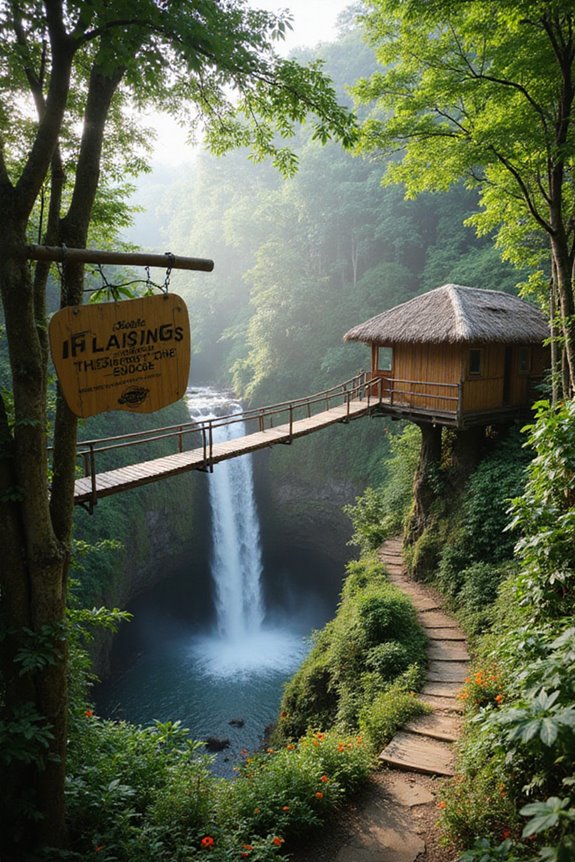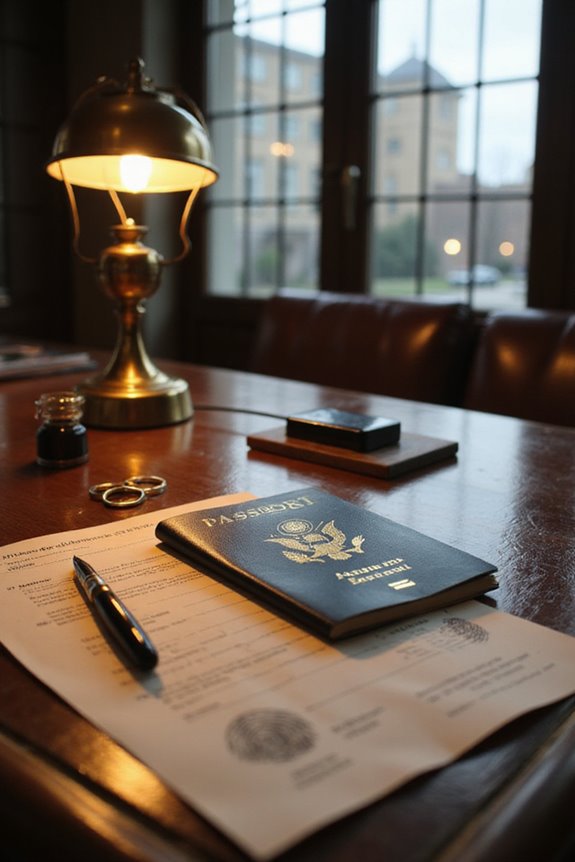If you’re diving into the travel industry, consider snagging a Certified Travel Associate (CTA) or a Certified Travel Counselor (CTC) certification—they’re pretty valuable! The CTA sharpens your destination know-how, while the CTC beefs up your credibility after five years in the biz. Then there’s the Certified Travel Industry Executive (CTIE) for those eyeing leadership roles. Oh, and don’t forget the ASTA Verified Travel Advisor (VTA) for niche markets. Want to boost your career even more? There’s plenty more to discover!
Key Takeaways
- Certified Travel Associate (CTA) enhances travel planning skills and destination knowledge, providing a fun learning experience.
- Certified Travel Counselor (CTC) improves professionalism and requires industry experience, showcasing expertise through a passing exam and white paper submission.
- Certified Travel Industry Executive (CTIE) prepares individuals for leadership roles, focusing on advanced strategies and business-to-business travel.
- Specialized certifications, like Certified Cruise Counsellor, cater to niche markets and enhance professional visibility and client attraction.
- Certification leads to increased client trust, measurable business growth, and higher earnings compared to non-certified travel professionals.
Certified Travel Associate (CTA)

When I first considered becoming a Certified Travel Associate (CTA), I had no idea just how much it would change my perspective on the travel industry. Taking the CTA exam was quite an adventure! I remember sitting there, surrounded by other hopefuls, nervous but excited. The test had about 50 multiple-choice questions focusing on everything from destination knowledge to travel planning. Once I passed, I dove headfirst into certification maintenance—the process of collecting Continuing Education Units (CEUs) each year. Staying current with trends and regulations is essential. Honestly, the ongoing learning makes this journey all the more rewarding, and I love that I get to hone my skills while staying informed. Who knew being a CTA could be this fun?
Certified Travel Counselor (CTC)

Diving into the world of Certified Travel Counselor (CTC) certification felt like stepping onto a thrilling roller coaster ride—one filled with twists, turns, and a rush of excitement. With five years in the travel industry under my belt, CTC exam preparation pushed me to level up my skills. The exam? A challenge, but nailing that 70% felt like winning a gold medal! The CTC certification benefits are unbeatable, though. It sharpened my professionalism, boosted my credibility, and opened doors to complex travel arrangements. Plus, submitting a white paper showcased my industry know-how. Oh, and don’t forget those continuing education units—keeping me fresh with trends and regulations. In every sense, becoming a CTC transformed my travel career!
Certified Travel Industry Executive (CTIE)

Stepping into the Certified Travel Industry Executive (CTIE) certification felt like unfastening a treasure chest filled with opportunities just waiting to be explored! With a solid five years in the travel biz under my belt, I dove into advanced travel strategies and executive travel management like a pro. The program’s focus on business-to-business travel was a game changer, sharpening my skills in analyzing market trends and negotiating with suppliers. Plus, the certification isn’t just a pretty piece of paper; it’s a badge of honor that elevates my credibility with clients and employers. I loved how it allowed me to learn at my own pace, all while pushing me toward leadership roles that I’ve always dreamed about. It’s a fantastic journey!
ASTA’s Verified Travel Advisor (VTA)

After earning my CTIE certification, I felt like I was just getting started on my journey through the travel industry. That’s when I discovered the VTA program overview from ASTA. This program isn’t just about checking boxes; it’s designed to boost our expertise and skills in areas like ethics and professionalism. The VTA certification benefits are fantastic too! It grants us a respected designation that enhances consumer confidence in our capabilities, which is essential for building trust. Plus, the self-paced online courses fit perfectly into our busy schedules. With this certification in our back pocket, I can genuinely say we elevate our careers—showing clients we’re not just travel advisors, but responsible, dependable professionals!
Sustainability and Ecotourism Certifications

When it comes to making eco-friendly travel choices, I’ve found that getting certified in sustainability and ecotourism sets me apart in a big way. These certifications, like those from the Global Sustainable Tourism Council or EarthCheck, not only bolster my credibility but also deepen my commitment to sustainable tourism. They push me to implement real ecotourism practices, from minimizing waste to supporting local communities. Plus, they help travelers like me identify businesses dedicated to responsible practices. It’s about being part of a movement that values our planet. Investing in these certifications can be a game-changer, enhancing the quality of our travel experiences and ensuring that we’re leaving a positive impact on the places we visit.
Specialized Travel Industry Certifications
While diving into the world of travel, I’ve come to realize just how important specialized certifications are for standing out in this vibrant industry. These niche certifications really help you carve your own path, whether you’re into cruising with the Certified Cruise Counsellor or excelling with the Certified Travel Executive. I’ve seen certification trends shift, too, with many advisors opting for the ASTA Verified Travel Advisor program, boosting their visibility. It feels like there’s a certification for every specialty, from travel agents to cruise experts, and each one adds unique value. Honestly, it’s about showcasing your knowledge and commitment, which not only attracts clients but also makes you feel fantastic in your professional journey!
Skills and Knowledge Areas Covered in Certifications
In an industry as dynamic as travel, having the right skills and knowledge can make all the difference, especially when you’re trying to shine among a sea of competitors. Certifications cover essential areas like client communication, where you learn to connect with clients genuinely and understand their needs. Trust me, that empathy goes a long way! You’ll also immerse yourself in travel negotiations, mastering how to secure those sweet deals with suppliers.
Besides, these programs teach technical proficiencies in global reservation systems, making those multi-city itineraries feel like a breeze. Plus, you gain insights into industry regulations, ensuring you stay compliant while delivering high-quality service. It’s like equipping yourself with a treasure chest of tools to navigate this amazing world of travel!
Market Impact and Career Benefits of Certification
Getting certified in the travel industry can be a game changer, as I’ve seen firsthand in my own journey. After earning my certification, I noticed a boost in my client trust and market recognition. In fact, 81% of advisors like me experienced measurable business growth right after getting certified! Plus, I found that having those credentials helped me connect better with clients, making them feel more confident in my abilities. With certified professionals earning 24.3% more, it’s clear those letters mean business. The pride I felt completing my certification hasn’t just elevated my reputation; it’s also set me apart in a competitive market. So, if you’re on the fence, just know that this commitment is truly worth it!
Frequently Asked Questions
How Long Does It Take to Obtain Travel Certifications?
When I think about how long it takes to obtain travel certifications, I realize the time commitment varies. The certification process often spans from a few months to over a year, depending on individual schedules and requirements.
Are These Certifications Recognized Internationally?
Certifications often have international recognition, enhancing their certification validity. I’ve noticed that established programs, like CTA and CTC, wield worldwide credibility, making them valuable assets for professionals seeking to stand out in the global travel arena.
What Is the Cost of Travel Certification Programs?
When considering travel certification programs, I’ve noticed a significant cost comparison. While basic training may start around $200, the benefits of higher certifications often justify the investment, providing valuable credibility and enhanced career opportunities in the industry.
Do Certifications Require Continuing Education Credits?
Did you know that about 75% of travel certifications require continuing education? Staying updated isn’t just a suggestion; it’s a certification requirement. I’ve found ongoing learning helps me maintain credibility and advance my career in travel.
Can I Work While Pursuing a Certification?
Absolutely, I’m managing work while pursuing certifications. The flexibility in coursework supports my work-life balance, and the certification benefits, like enhanced skills and career opportunities, make the effort worthwhile. It’s all about finding that balance!





